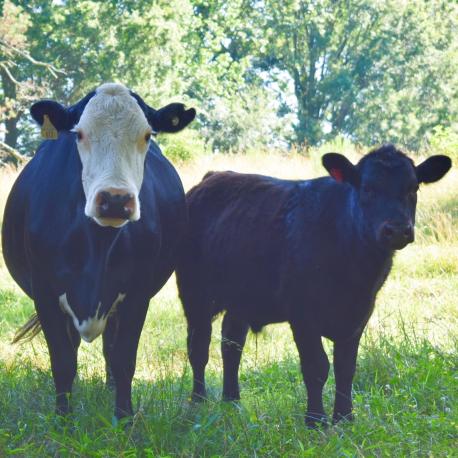Through Thick and Thin

David's Double Oaks Farm, includes a 50-cow commercial beef cattle herd supported by a rotation of peanuts, corn and small grains.
Many successful farmers, such as Farm Credit of Northwest Florida director, David Yoder, were born into agriculture and were raised to appreciate every minute of it.
“What’s not to love?” he asks rhetorically, continuing, “We get to use the value of God’s creation, the resources he provides, to help feed our communities and support our state, all while raising a family and teaching them the value of hard work and commitment.”
David’s grandparents moved to Florida to farm in the early 1950s, and his parents began their diversified operation in the 80s, eventually expanding to 5,000 acres of row crops along with a 250-head dairy herd and 120-head of beef cattle. Then, in 1994, David lost his father in a farming accident.
David had just turned 18, and he and his three older siblings ran the parents’ operation for the next five years before his older brother returned to finish college, followed by David, who eventually earned a bachelor’s degree in food and resource management and a master’s degree in agronomy with a specialization in Ag Business from the University of Florida.
Once David finished school, he turned to build his farming operation, working at times with his brother, Steve, who later purchased the family farm from their mother and still runs the operation. David bought his first 170-acre parcel with financing from Farm Credit in 2015, then later financed another two parcels for a total of 400 acres.
“I would not be where I am without Farm Credit. That’s just the bottom line,” David says. “They looked at the 5 Cs of Credit and were willing to take a chance on a young guy looking to begin his operation, and they’ve been great to work with ever since.”
David points to Farm Credit’s flexibility as a significant value, as he could switch from monthly to annual payments to match his revenue cycle. When rates dropped, David’s loan offer proactively contacted him with an offer to lower his interest rate on his longterm fixed rate loan... He appreciates his loan officer’s tenacity.
“No commercial bank would have done that,” he says.
Today, David’s Double Oaks Farm includes a 50-cow commercial beef cattle herd supported by a rotation of peanuts, corn, and small grains.
“Cattle is our main occupation, with a small mix of row crops we rotate in when we have open cropland, and the markets make sense,” he says, explaining that much of their land is used for summer pasture. He also had timberland until Hurricane Michael came to call in 2018, devastating his trees so severely that David is still cleaning up debris, as well as replanting.
Since David embraced farm life from childhood, it is only logical that his daughter has decided to engage in farming. She has built her 25- head herd for the past four years, improving genetics through artificial insemination.
“We run our herds side by side, both working to increase the value of our animals but in different ways toward different purposes,” David says.
For him, that means looking at trends and deciding which breed of cattle to raise. He made a big decision to implement a transition from black-hided cattle to red.
“We lost so many trees to the hurricane that we have little shade to offer comfort to our animals,” he says. “Red-hided cattle have a higher heat tolerance, so we’re transitioning our herd.”
Every decision David makes – including the hope of expansion despite Florida’s notoriously high land prices – must take minimal time to implement and manage because he also has a full-time, off-farm job as a territory sales manager for Valent, a crop protection company. Despite the split responsibilities, he plans to expand his herd strategically by selling older cows and replacing them with higher value, better-bred heifers.
Yet he still finds time to serve as a director on Farm Credit of Northwest Florida’s board, where he says he is learning a lot and bringing his experience and insight as a young, beginning, and small farmer.
“Being on the board is a servant’s role, working to make things better for our members and community,” David says. “This means staying competitive with our offerings and responsive with our service while also paying attention to federal regulation and the increasing focus on ESG issues.”